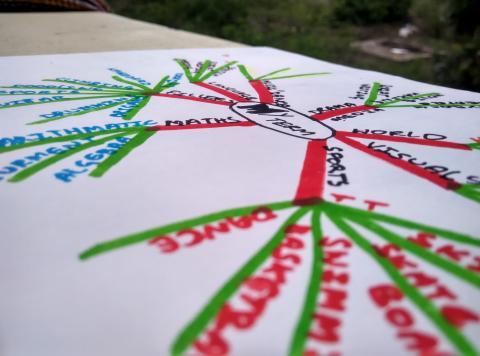
Celebrating “thinking skills Observation” this week. What is this? How is this different from “seeing or just observing”? How do we develop the thinking of observation? Observation is not limited to visual sense – its a way to think. We all play in rain, but some of us observe – how is the phenomena happening, how it is falling, feeling, how does it fall on mud, sound it makes, destruction it causes.
We observe new situations, place, people in detail – maybe we feel insecure, anxious in a new place, seeking info in new place or just joy of newness. So, sometimes constraint can lead to being more observant!Night walk in thought club brought an opportunity to be with self – observing sounds, colour, wind, clouds, trees, insects, fear, moon, stars, feel of sand barefoot and inner peace. Various planning tools brought an opportunity to look at planning through various windows!
A Jaatre (Session) on the the same brought an more curiosity about thinking skills – observation.
Find the animals – https://www.youtube.com/watch?v=KDbkfhDEKuw
Ponder “What is Thinking Skills Observation” –
Next, Watch a science experiment and note down what you see (do not note down the words like experimenting etc – note down what you see happening – you cannot see an experiment, you can see that someone is mixing a liquid and so on. Do Not give any explanation to any experiment, only record what you “SEE”).
https://www.youtube.com/watch?v=Hr6dZ6aWpF4
https://www.youtube.com/watch?v=CCxbI1qRsWY
Ponder “What is Thinking Skills Observation” –
Solve these riddles
https://www.youtube.com/watch?v=20jnOMouUa0
https://www.youtube.com/watch?v=Br5brNO7Asc
Ponder “What is Thinking Skills Observation” –
Watch ways to develop observation skills.
https://www.youtube.com/watch?v=ucmurASGjLE
Ponder “What is Thinking Skills Observation” –
Watch this tedtalk and Ponder “What is Thinking Skills Observation” –
https://www.youtube.com/watch?v=LFaJsZcrz_0
If you are still curious to know more about “What is Thinking Skills Observation” read the notes below
Thinking Skills Observation – An ability to stay with observation, not get too soon into analysing, evaluating, producing or processing it further in any which way. Observation is one of the main components in design thinking. Yet it is often a stumbling block in our ability to create breakthroughs, because we are so used to seeing the same thing in the same way. Of course observation skills are not limited to what we see, we should employ all of our senses and what we notice (or not notice) with our ability to observe visually can also be applied to what we hear, feel, smell and taste.
Source – http://viscog.beckman.illinois.edu/flashmovie/15.php
-
Stay with observation (using all five senses) – It is the ability of the mind to use its sense to soak in what is around.
-
Observing in and for details – Look beyond obvious – to see more in a tree beyond a tree as an object.
-
Observe for relevant information – To collect relevant information by observation. Like Temple Grandinlin observe behaviour of cows by observing them.
How to develop?
-
Observe many times
-
Stay with observation without processing it further
-
Answering to a problem via observation
-
Look for more details
-
Use constraints – like use only eyes, use only sound or touch etc.
-
Constraints what you observe, cut down the details
-
Observation sequenced from simple to complex and from familiar to unfamiliar.
Activities examples, Real Life experiences, Places where and how one create opportunity of exposure
-
Observe behaviours of animals.
-
Observe chemical changes during an experiment.
-
Observe results while imposing laws of physics.
-
Observe social behaviours in a given setting.
-
Observe change in patterns.
-
Study visual art from a particular period and identify common qualities.
-
Identify musical patterns.
-
Observe dance movement to determine the mood it represents.
-
Constraints what you observe – make a frame and see through that frame.
What it is not?
-
Merely looking for recognition or identification is not observation.
-
Seeing (and expressing) the same thing (repeatedly)
-
Seeing something, but focussing on one’s thoughts about it (eg seeing a tree and talking about the biggest tree in the world or thinking about how will i grow this tree etc).
Misconception
Ask for details for corrections to check, not applying but I am observing